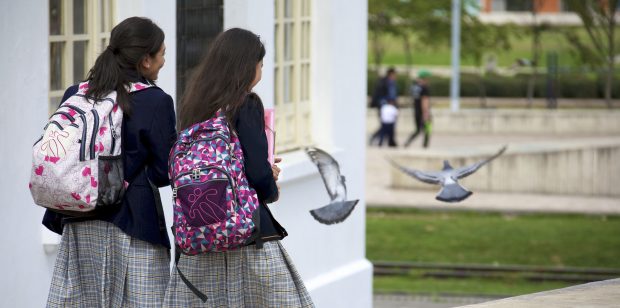
Today’s Education in the media blog focuses on the topics of school places, peer on peer abuse, and the 70th anniversary of the Fulbright Commission.
Sutton Trust Report
Today, Thursday 13 September, the Sutton Trust published a new report on how social class influences parents’ ability to support their children in their schooling, which is based on a YouGov survey of 1,017 parents of school-age children. The top line of the report looks at the number of parents who have taken a range of measures to ensure their child gets into a certain school, such as choosing to move or attending church regularly. This has been covered by the Times, the Guardian, the Independent, the Daily Express and the Sun.
Our latest admissions data shows that 93.8 per cent of children received offers from one of their top three choice of secondary school last year.
Minister for School Standards Nick Gibb said:
This Government has driven the largest creation in school places in two generations and by 2020, there will be one million more new places across the school system than there were in 2010. This is backed by the £23 billion of capital we are spending by 2021, ensuring every child has access to a good school place. If it is established that a school place has been offered on the basis of fraudulent or misleading information, then the local authority or an academy’s governing body may withdraw the place if appropriate.
Last year, 93.8 per cent of pupils received offers from one of their top three choice of secondary school and we now have 1.9 million more children in good or outstanding schools than in 2010. But we want to give parents greater choice when looking at the schools that are right for their children.
Peer on Peer Abuse
Yesterday, Wednesday 12 September, Minister Zahawi spoke at the Farrer and Co Annual Safeguarding Conference. This was followed up today, Thursday 13 September, with a BBC News Online piece based on comments from two mothers whose children were victims of peer on peer abuse.
Through Relationships and Sex Education, we want to promote the understanding of healthy, positive and respectful peer to peer relationships, by teaching young people about boundaries, consent and staying safe online.
We launched a consultation on the draft regulations and statutory guidance on 19 July which is due to close on 7 November 2018 to make sure these subjects prepare all young people for life in a modern Britain.
We have also been developing evidence on the scale of the problem by including questions on the prevalence of bullying, including sexual bullying and harassment in our omnibus survey of schools and will use these findings to inform future policymaking.
The department is supporting the NSPCC through an £8 million grant contribution over four years to 2020 which goes towards funding Childline and the NSPCC’s National Helpline. In 2016/17, Childline provided over 3,000 counselling sessions to children and young people concerned about being sexually assaulted by peers.
Minister for Children and Families, Nadhim Zahawi, said:
Peer on peer abuse can have a devastating impact on children and their families, which is why we have taken action to give this serious issue the prominence it deserves. Pupils and parents rightly expect schools to be safe places, where children are free to enjoy their time in education without fear of violence or harassment.
From September all schools and colleges must follow guidance which includes how to support young victims of peer on peer abuse, including at primary school level. Our guidance is clear that schools and colleges should separate victims and alleged perpetrators in the case of allegations of rape, and is also clear that schools and colleges should be prepared to put in long-term support for victims. The needs of the victim should come first and disruption to their education should be kept to a minimum.
We are also making Relationships Education compulsory in all primary schools – where pupils will be taught how to build healthy respectful relationships – and Relationships and Sex Education compulsory in all secondary schools, which will both teach children about topics such as consent.
Fulbright Commission
Yesterday, Wednesday 12 September, Minister Gyimah spoke at the US-UK Fulbright Commission’s reception in the House of Commons, to celebrate its 70th anniversary.
The minister committed a total of £1 million for UK-US international exchanges. This funding will allow more young people and academics from disadvantaged backgrounds to experience the world class education that both countries has to offer, building on the 23,000 plus educational exchanges that Fulbright has facilitated.
The UK and US make up nine out of ten of the world’s best universities.
The Universities Minister Sam Gyimah said:
At the heart of our great nations’ success is great education. The UK and the US are both powerhouses on the international stage, attracting talented students and teachers from across the globe to broaden both of our horizons.
I recognise that, with the prospect of Brexit here in the UK, there is much concern as to what the future holds for our relationship with the outside world. Let me reassure you with this gesture that we are committed to the UK remaining open to the world and becoming even more global and internationalist in outlook.
As the only scholarship programme supporting students and scholars on both sides of the Atlantic, across all disciplines, the US-UK Fulbright Programme is a prime example of the ‘special relationship’ that has blossomed between our two countries. And it is a partnership of which we are extremely proud.
You can read more about the minister’s commitment to Fulbright here.